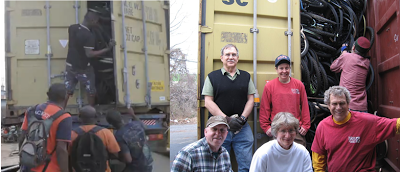 |
| LEFT: Ghana. RIGHT: Springfield, Virginia. SAME container. |
 |
| BfW bikes heading to Ghana's upper east region |
From there, 240 bikes were transported north to the Upper East Region of Ghana where VBP was hosting a bicycle training program for three regions in June. To put the geography in perspective, the distance between Accru and Sandema, one of the villages where they were teaching, is 788 km or about 15 hours of drive time.
 |
| Basket weaver in Laabissi |
Participants in the classes vary in age, occupation, and sex. In Nyobok, for example, VBP was shocked at the huge female turnout accounting for 72% of trainees. Most were farmers and then students.
Back in April VBP traveled to Laabissi and met the basket weavers who would be participating in the program taught in June. The bikes they received last month were all equipped with rear carriers to assist in carrying their finished baskets to market for sale. 80 women associated with this craft participated in the training programs in Laabissi.
VBP Program Coordinator Jason led the training programs alongside local trainers Sammy and Moro, both from the Upper East Region of Ghana. Not needing a translator made the curriculum much easier to deliver and grasp.
All participants paid a small fee to enter the program and received a bicycle from VBP for about $5 USD.
 |
| Upper East Region of Ghana |
Even more proof of how successful and anticipated the classes are can be seen in the attendance. Eager participants were gathered in Nyobok by dawn the day of training. The start time was supposed to be 8am, but they called for the trainers as early as 6am.
Later in the day, VBP offered a more in depth look into bicycle mechanics in their Advanced Class. Here participants learn skills like wheel truing and bearing assemblies. They are also offered hand tools at a 50% discount. There was such a huge turn out VBP ended up holding two classes instead of one and had to bring in more tools from the warehouse.
Jacob and Emmanuel came out to help VBP with training in Nyobok. Emmanuel's wife received a bike during the last training session. Jacob is in his early 20s and he also helped last time. The VBP trainers saw a huge improvement in his skills from before. Both local trainers were gifted with bicycle specific tools for assisting.
Pelungu is the nearest market town where bike owners go for parts and repairs. Francis, the local mechanic there, runs a large workshop with a staff of twenty. VBP is suggesting Jacob train under Francis to become an actual bicycle mechanic.
 |
| Young student learns how to loosen handlebars |
Later that evening they invited her back and introduced even more specific tools such as the crank-puller and chain-breaker. Training with these types of tools is usually left for local bicycle repairers. VBP gave Rita her own set of tools before tasking her with the challenge of caring for the 80 bikes delivered to her community by VBP.
Dispatch 32: Simon, What We Learned from Ash Dumford on Vimeo.



No comments:
Post a Comment
Note: Only a member of this blog may post a comment.